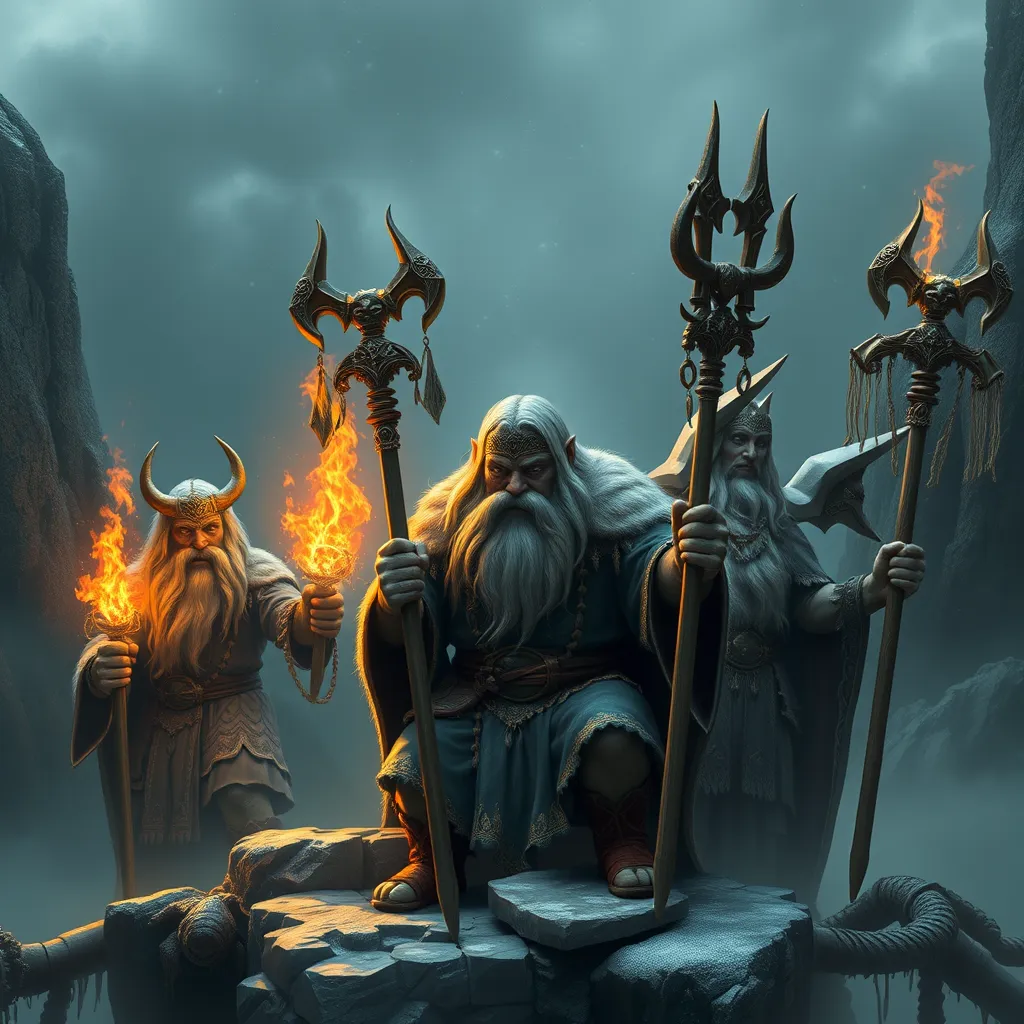The Dwarven Pantheon: Discovering the Gods and Goddesses of Dwarf Culture in Norse Mythology
I. Introduction
Norse mythology is a rich tapestry of stories and beliefs that encompasses the ancient Norse culture. Its significance lies not only in its historical context but also in how it has shaped modern perceptions of mythology and folklore. Among the many fascinating aspects of Norse mythology is the Dwarven pantheon, a collection of gods and goddesses that embody the unique traits and values of Dwarf culture.
This article aims to explore the Dwarven pantheon, shedding light on the deities that hold a significant place in Dwarven mythology, their origins, and their impact on Dwarven society. Through this exploration, we will uncover the depth of Dwarven spirituality and craftsmanship that has captivated the imagination of many.
II. The Origins of Dwarven Mythology
The origins of Dwarven mythology are deeply intertwined with the creation myths of Norse lore. According to the tales, the dwarves were born from the blood of Ymir, the primordial giant. When Ymir was slain by Odin and his brothers, his body was used to form the world, and from the earth and the stones, the dwarves emerged.
As skilled craftsmen, dwarves play a crucial role in the creation myths, providing the gods with powerful artifacts and tools. Their craftsmanship is celebrated in various narratives, showcasing their significance as the builders and artisans of the mythological world.
III. Key Dwarven Deities
The Dwarven pantheon is home to several notable deities, each representing different aspects of Dwarven life and culture. Here, we will highlight some of the primary gods and goddesses and the significance of their domains:
- Durin: Known as the father of dwarves, Durin is a central figure in Dwarven mythology. He is often associated with the creation of the Dwarven race and is revered as a progenitor of Dwarven kings.
- Ivaldi: Ivaldi is celebrated as the master craftsman, revered for his unparalleled skills in smithing and creation. His creations include some of the most powerful artifacts in Norse mythology, such as weapons and treasures for the gods.
- Bragi: The god of poetry and eloquence, Bragi holds a special place in Dwarven culture. He represents the importance of storytelling and song, emphasizing the value of oral tradition among the Dwarves.
IV. Dwarven Culture and Religion
The influence of deities on Dwarven society is profound. The gods and goddesses serve as embodiments of the values that Dwarves hold dear—craftsmanship, loyalty, and the importance of community. Worship of these deities often involves rituals that celebrate their contributions to Dwarven life.
Rituals and practices in worshipping Dwarven gods may include:
- Crafting ceremonial items as offerings to the gods.
- Gatherings where stories of the gods are recited, fostering a sense of community.
- Celebrations of significant achievements in craftsmanship, honoring the influence of Ivaldi and others.
Craftsmanship and creation are central to Dwarven belief systems, with the act of creating seen as a sacred duty. This connection to their deities reinforces their identity as artisans and builders.
V. Myths and Legends Featuring Dwarven Deities
Numerous myths and legends feature Dwarven gods and goddesses, illustrating their roles in the larger narrative of Norse mythology. One notable story involves the creation of Thor’s hammer, Mjölnir, which was forged by the Dwarven brothers Sindri and Brokkr. This tale not only highlights the Dwarves’ craftsmanship but also showcases their interaction with the Aesir gods.
Interactions with other pantheons, particularly the Aesir and Vanir, are significant. Dwarves often found themselves involved in conflicts and alliances that shaped the narrative of the Norse cosmos. These myths help in understanding Dwarven identity and their place within the broader mythology.
VI. The Legacy of Dwarven Deities in Modern Culture
The legacy of Dwarven gods continues to thrive in contemporary media. They are frequently depicted in fantasy literature, games, and films, influencing how Dwarven culture is perceived today. Popular franchises such as “The Lord of the Rings” and “Dungeons & Dragons” draw inspiration from Norse mythology, portraying Dwarves as noble warriors and master craftsmen.
This representation has evolved, with Dwarves often embodying themes of resilience, loyalty, and craftsmanship. Their portrayal in modern culture underscores the ongoing fascination with Dwarven mythology, ensuring that these ancient deities remain relevant in today’s storytelling.
VII. Comparative Analysis: Dwarven Deities vs. Other Mythological Figures
When comparing Dwarven deities to figures from other mythologies, several similarities and differences emerge. For instance, like the Greek god Hephaestus, who is the god of fire and craftsmanship, Dwarven gods also embody the spirit of creation. However, while Hephaestus is often portrayed as somewhat isolated, Dwarven gods are deeply integrated into their communities and cultures.
Additionally, Dwarves share traits with other mythological beings, such as elves and giants. However, their focus on craftsmanship sets them apart, as they are celebrated not only for their strength but for their skill and artistry.
The unique aspects of Dwarven spirituality emphasize the importance of creation and community, positioning them as vital figures in Norse mythology.
VIII. Conclusion
In conclusion, the Dwarven pantheon holds a significant place in Norse mythology, representing the values and beliefs of Dwarf culture. Their gods and goddesses embody craftsmanship, loyalty, and community, weaving a rich narrative that continues to inspire and captivate audiences today.
The enduring fascination with Dwarven culture and mythology speaks to the universal themes of creation and identity, ensuring that these ancient deities remain relevant in our collective imagination.



